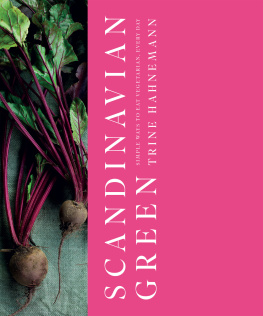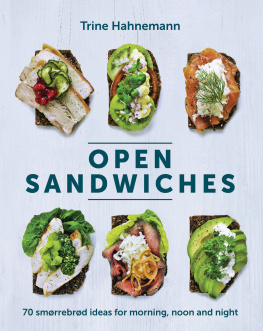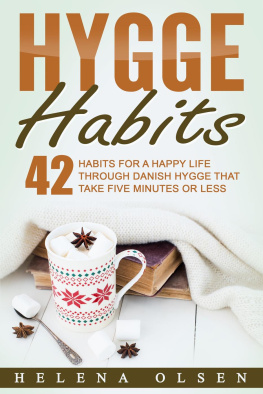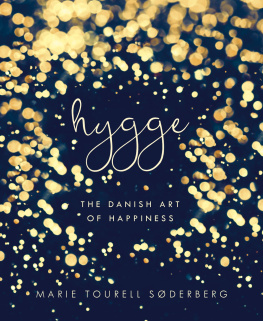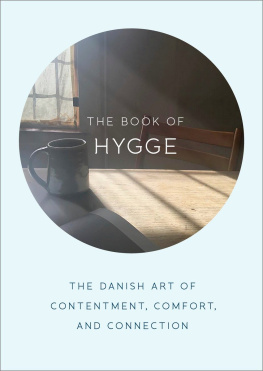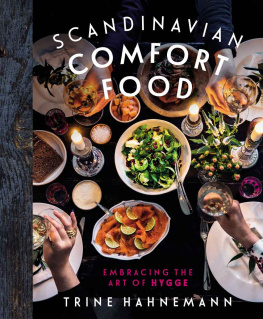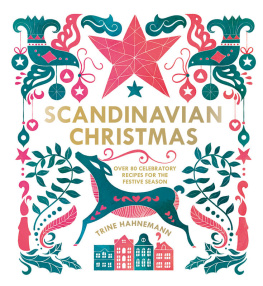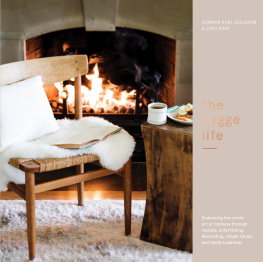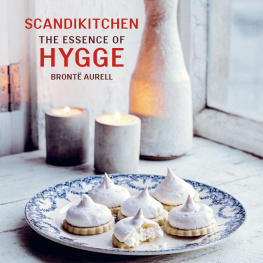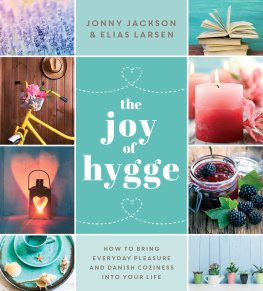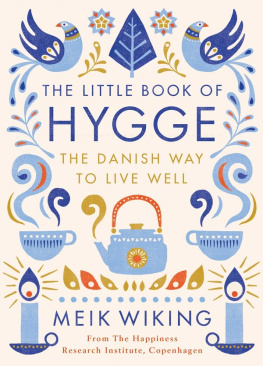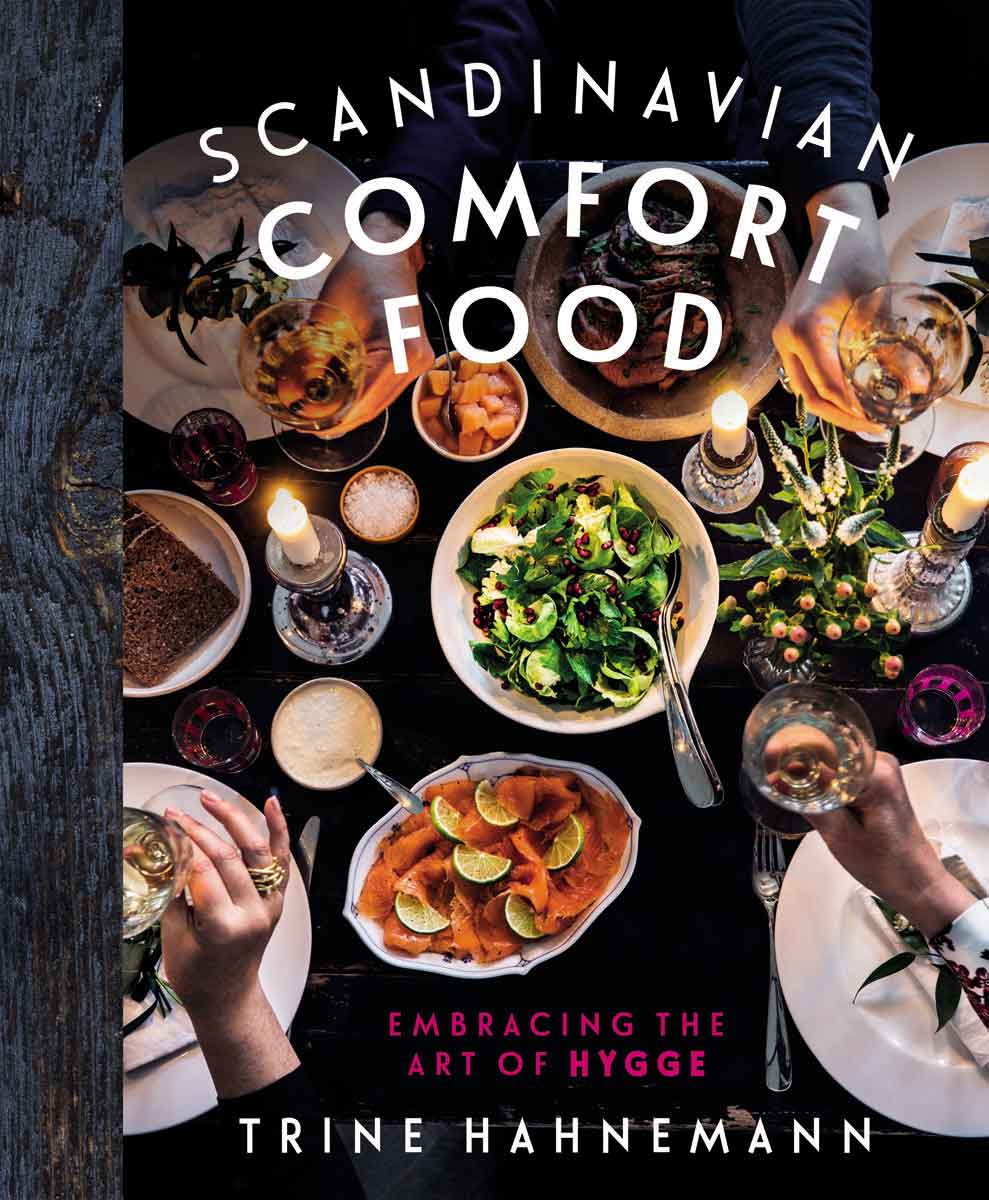I live a life that revolves around food. I cook, I write, and I own and run a company that cooks and serves lunch for 3,000 people every day in Copenhagen. All my work is based around food organic and sustainable and a good life. In a Danish context this always somehow involves hygge a concept that I describe on .
To describe hygge is difficult because it is so embedded in our culture. Its not cosiness as such; its a feeling and an expectation, an everyday part of the Danish language. This book is about the way I cook and eat and that will, in turn, inevitably become a story about hygge since its so ingrained in our food culture. Even the absence of hygge is defined and recognized.
The book is divided into chapters that reflect the way I eat and cook. What I Eat During the Day is a range of light recipes for late breakfast and lunch that could easily be turned into dinner. My familys stories and traditions are the focus of Our Family Meals I hope that most people can find time to eat together regularly. I share some of my celebrations with friends and family through the year in Easter Hygge, Friends over for Christmas Lunch and Christmas
Dinner at my House. It is inevitable that I should write about My Love of Vegetables, because I enjoy cooking them so much, and I eat a lot of them. In Soups for Every Season the recipes are both new and classic. Youll see that I use a lot of vegetables mixed with grains, herbs and spices in The Salads I Eat. Finally, as well as vegetables, I could easily live on The Breads I Bake and Something Sweet.
I am not a fan of food trends that dictate rules about what we should and shouldnt eat; just keeping up with all the rules is stressful. I believe in the importance of food culture, both historically and currently. Eat balanced food, follow the seasons, be responsible, enjoy eating, and make room to indulge now and then. I juice, I eat grains, meat, fish, and lots of cooked and raw vegetables, but I also appreciate cake, and a glass of wine.
Nothing is more vital to me than to have a great time around food with other people. To cook and share: that is our biggest asset in life. I hope this book will inspire you to make life hyggeligt every day, and to cook for friends, strangers, neighbours, lovers and family.
Velbekomme!
We all have to eat that is stating the obvious but to eat in our modern Western world, we do not have to cook. We have the choice to eat enough calories every day without ever getting near a kitchen. It will surprise no one that I think that is a disaster. Cooking has many functions, and one is making sure that biodiversity is on our plates, which in practice means using a wide range of ingredients over the shifting seasons. Processed foods tend to streamline ingredients so that they get the same process every time. Therefore, you have to eat real cooked food.
I believe very strongly in organic produce, and for one simple reason: I do not want any toxic chemicals in my food. I like to eat clean, tasty, and fair food.
So I try to eat as much organic as possible. All my dairies like milk, cheese, and yogurt are organic; I only bake with organic flour; all eggs and chicken I eat are organic; I only buy organic meat, and the way I can afford that is by only eating meat twice a week. My herbs, I grow myself. All basic vegetables like carrots, onion, garlic, potatoes, and root vegetables are organic. Then I try to buy organic for all the rest as well. Over the last ten years it has become much easier to live organic in Denmark because demand is rising, so supply is growing. Organic has become important business for supermarket growth strategy.
People often complain that organic, certified or not, is more expensive. I say that is not true not when you understand what goes into growing food. Visit a farm. When did we decide food has to be inexpensive? That decision also comes with a cost, which is our quality of life. The other thing is: also think about eating less, and not wasting food. That will translate directly into your budget. A further idea is to make sure that supermarkets are not driving prices up, so try to buy directly: go to farmers markets, subscribe to a box scheme wherever you live, and join a co-up or start one in your own community.
I am not a scientist who can explain elaborately, what the problem with non-organic food is. For me its common sense. Spraying toxic chemicals on our soil and produce, asking farmers to work in that environment, is wrong and at the same time messes with natures laws, which is asking for disaster. I think toxic chemicals sprayed in nature harm our health; I do not believe you can qualify that statement. Therefore, my dream is that in the next 100 years the world of agriculture will turn organic. I simply do not believe that we cant feed this planets population on organic food. Mother nature is so clever; we can find that balance. We need to do this wisely, taking all external factors into account.
We have to grow our food in a sustainable way, not waste it. We need to have time to cook and have fun when working in the kitchen. It makes us understand the significance of taste from clean produce, how all these wonderful colourful vegetables that come from the soil can turn into wonderful dishes that make our life enjoyable. Its about having a good life, and I truly believe eating and cooking are a key factor in realizing that!
For a cook its very simple: you are never better than your produce. This goes for home cooks as well. So, cooking real food also implies that you have to source responsibly. There is a beautiful biological system going on that my farmer friends have explained to me. I love to visit people working in the organic agriculture business and see how their work flourishes. All my knowledge comes from these visits. When I cook, I like to think I support the farmers hard work.
Growing organic food in a mix of small and large polyface farms is a way to guarantee a better future for our planet. Polyface means that you have both crops and animals and that you grow a diversity of grains, plants, and vegetables. Its like farming in the old days before monoculture factories alienated from nature began to dominate. We do not have to turn back the clock, or start using horses again. It can be done with technology, using all the knowledge we have available today.
I believe as a citizen of this world that we have enormous responsibilities when it comes to how to source the things we eat. We have the power to make changes by taking concise and deliberate decisions when we spend our money on food. I want to spend my money on food grown responsibly, on farms full of life and full of people who work there farms that allow nature to be part of the daily life that grows there. I would like to be able to pay a visit, go out into the field, and pull up a carrot from the soil without fearing it will kill me when I eat it.


